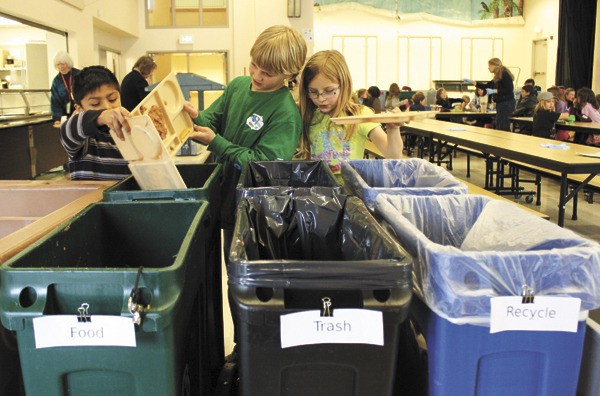As Vashon School District officials make decisions about the energy efficiency and sustainability of the new high school building, the youngest students in the district are being faced with some “green” choices of their own.
Last week during lunchtime at Chautauqua Elementary School, a first-grade boy emptied a bag of cracker crumbs into a bin marked “food.” Then, holding the plastic baggie over another bin marked “trash,” he thought for a moment then asked a lunchroom helper, “Can I put this in here?”
The elementary schoolers who until recently dumped their lunch waste — compostable trays and all — into trash cans began to use a new recycling center in the cafeteria this month.
District facilities director Dave Wilke, who is heading up the effort, said that by separating reusable trays, food waste, liquid waste and recyclables, the elementary school has already reduced its lunchtime trash output from about 10 bags a day to just one.
But perhaps more importantly, Wilke said, the new recycling station provides an opportunity for the students to learn about the importance of recycling and decreasing waste.
It’s the first step in a new district-wide project to bring sustainability into the classroom and encourage students to change their habits.
“That little piece at Chautauqua is indicative of what could be implementable over numerous systems and facets of daily life,” Wilke said. “There’s dozens, if not hundreds, of teachable moments every single day.”
The district will implement a similar lunchtime recycling program at McMurray Middle School next month and at the high school by the end of the year. And though there are no firm plans after the recycling stations are up and running, Wilke said he will continue to develop strategies to educate students about conservation in the classroom.
Superintendent Michael Soltman called the new effort the best way to ensure the district continues to cut back on energy use, water use and waste.
“We know we can reduce energy costs, and we can reduce solid waste costs by making some changes in the buildings,” Soltman said. “We also know the greatest difference we’re ever going to make is in changing user habits and changing how people use energy and resources. The education component is the strongest sustainable measure we can implement.”
Chautauqua principal Jody Metzger said the elementary schoolers were excited about the new recycling station, especially after they learned their leftovers would go to pigs on Vashon farms.
“It gives them a purpose. They understand … some animal is getting food from it, and we have way less waste, which is good for the environment, which is good for us,” she said.
The district, too, will save significantly on disposal costs, Wilke said, as trash has been exponentially reduced and recycling is about one-tenth of the cost of disposing trash.
The lunchtime food waste is now dinner for pigs at Sun Island Farm, owned by Joe and Celina Yarkin. Wilke said eventually other farmers with chickens and pigs will get involved as well, and McMurray lunch waste will go into an industrial-size composter that will provide fertilizer for the campus.
The Yarkins, who pick up the food when they drop off their kindergarten daughter for afternoon class, say their pigs go crazy for the flavorful scraps.
“I’ve just about posted a menu out by the pig pen for them to read what’s coming each day,” Yarkin said with a laugh.
The Yarkins are grateful for the scraps, he said, and also grateful that their three school-age daughters will learn about conservation during their school day.
“We certainly recycle everything (at home),” he said. “It’s just more consistent to do it at school as well, and not see things get wasted every day.”
Wilke said similar lessons could be applied to a number of conservation efforts at the school. For example, the installation of new low-flow faucets in sinks could be a chance to teach students about water conservation.
And new heating systems set to be installed at McMurray and Chautauqua will give teachers greater control over classroom temperatures. So it’s likely classroom temperatures will be set lower in the winter months to conserve energy and students will learn to bundle up for class, he said.
Wilke hopes eventually children will even study statistics about their buildings’ energy use, relating the numbers to factors such as classroom temperature.
“We could change it and just have people be chilly, or we can come around and engage people and say this is why,” he said. “Rather than just make the change, we’re turning it into a teachable opportunity.”
It’s those teachable opportunities that the district hopes will stick with young students as they move through the school system and eventually enter the new, more efficient Vashon High School.
“Within a several-year time period we are creating a significant culture shift with users of the Vashon Island School District,” Wilke said. “We are populating our district with students that are highly aware and engaged and desirous of doing the right thing.”



